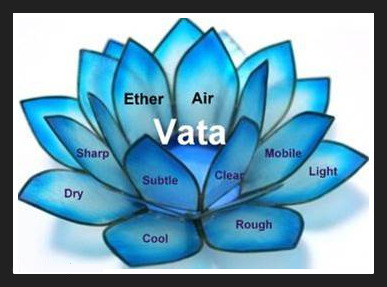What is Vata body type and what does it means to us: Since we born, every person being has an individual combination of the three type of body constitution (body dosha or Ayurveda body type)
- Vata
- Pitta
- Kapha
The Vata Dosha (most important) contains the properties of the elements ether and air. Since Pitta and Kapha cannot move without it, Vata is considered the leader of the three Ayurvedic Principles in the body. It’s very important to keep Vata in good balance.
When Vata is in balanced condition: Vata governs all movement in the body and mind. Vata is mainly responsible for our energy and all body movement as well as for nerve impulses. It controls breathing, speech, circulation, digestion, elimination of wastes, mild to variable hot flushes (Invariable), panic, nervousness, mood swings, palpitations, bloating and the movement of thoughts across the mind. Vata people often with dry skin and hairs, paired with cold hands and feet, they tends to sleep lightly and wake easily. Vata people are live in equilibrium, creative, remain vibrant and friendly. They are closely connected to the spiritual. Vata people love music and dance. Moreover, they are active and like to move.
When Vata is in imbalanced condition: Physically, pain is the most obvious symptom of excess vata, other common signs are variable appetite, insomnia, dry skin, constipation, weakness, anxiety, hypertension, restlessness, flatulence, and irregular menstruation. Vata people are quick-witted, meaningless money expenditures and open to new experiences. We like their easiness but not their forgetfulness. Vata body type can easily gain weight and other side they easily can loss weight as well, which is the good point for vata constitution people.
Advice for Balancing Vata:
- Eating in a peaceful environment is very important for vata type body people.
- Drink Ayurveda herbal tea with ginger, cardamom and cinnamon etc.
- Drink lukewarm water and fresh juices.
- Eat cooked and warm food (less raw foods).
- Add 1 spoon of cow-ghee everyday in your diet.
- Favour warm, oily, heavy foods and sweet, sour, and salty tastes.
- Do follow regular daily routine and exercises
- Got to bed early and tale lots of rest.
- Do regular daily elimination.
- Do at least once a week Abhyanga (ayurvedic massage with sesame oil) before shower.
- Stay warm in cold and windy weather.
- Eat something at least within 3-4hrs
Vata-Pacifying Diet:
- Vegetables: You can eat these vegetables if they are cooked, especially with ghee or oil and spices: peas, broccoli, green leafy vegetables, cauliflower, celery, zucchini, potatoes, beetroots, cucumbers, carrots, asparagus and sweet potatoes are good.
- Fruits: Favour sweet, sour, or heavy fruits, such as banana, grape, orange, avocado, cherrie, melon, berrie, papaya, plum, pineapple and mango.
- Dairy: All dairy products pacify Vata. Always boil milk before you drink it and only drink warm milk.
- Sweeteners: All sweeteners are good for pacifying Vata.
- Beans: Reduce all beans, except moong dhal and eat light and easily digestible.
- Oils. All oils decrease Vata in the body.
- Grains: Rice and wheat are very good. Reduce intake of barley, corn, millet, buckwheat and oats.
- Spices: Cardamom, cumin, ginger, cinnamon, salt, cloves, mustard seed and small quantities of black pepper are acceptable.
- All dry fruits and nuts are good, but eat dry fruits only overnight soaked.
Ayurveda herbs for Vata pacifying:
- Vidarikand (Pueraria tuberosa)
- Ashwagandha (Withania somnifera)
- Guduchi (Tinospora cordifolia)
- Brahmi (Bacopa monnieri)
- Shatavari (Asparagus racemosus)
What to Avoid:
- Avoid pungent, bitter and astringent tastes.
- It’s better to avoid sprouts and cabbage.
- Don’t skip the meals when you are busy or stressed.
- Don’t drink milk with a full meal.
- Don’t drink cold water and beverages.
- Reduce dry, light and cold food.
- Don’t miss breakfast.
- Don’t do much fast.
- Avoid junk and canned food.
- Don’t use AC and direct fans.
- Don’t eat in any sensory distractions or when moving.
- Avoid most dried fruits eq. apples, cranberries, dates (dry), figs (dry).

